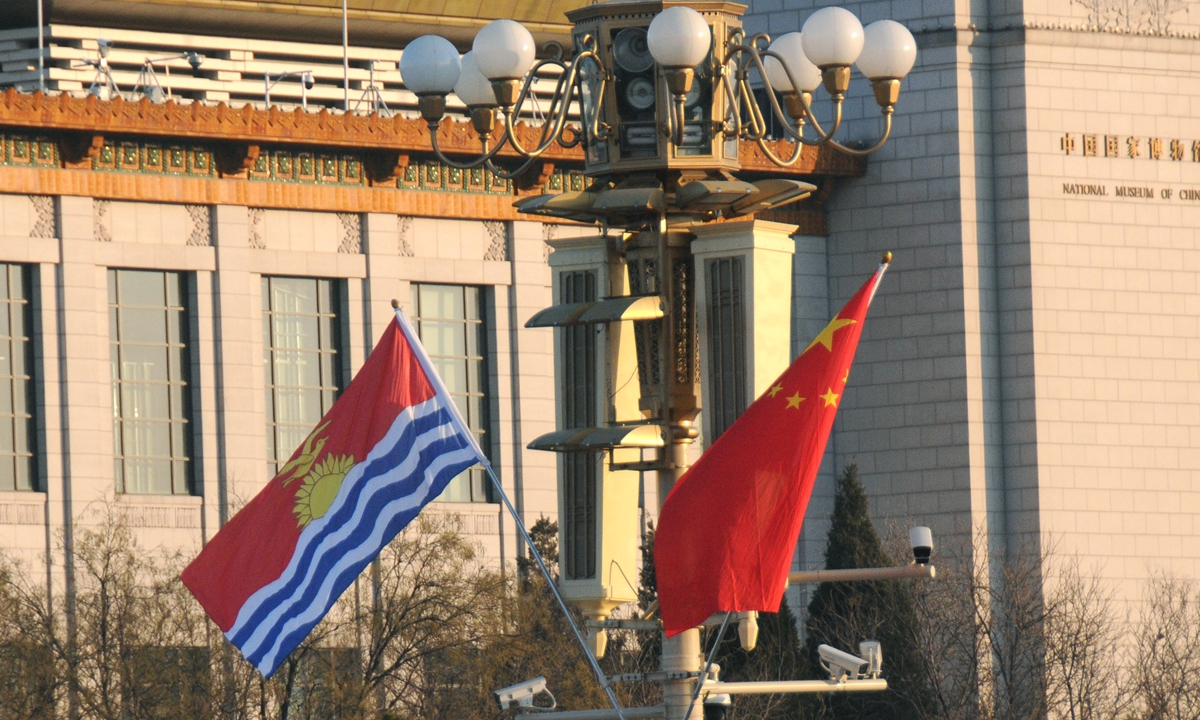
National flags of China and Kiribati Photo: VCG
People in Kiribati went to the polls on Wednesday for the first round of voting in a national election with climate change, living costs and China ties in focus as president Taneti Maamau seeks to extend his tenure in the Pacific island nation.
While foreign media outlets are hyping that the national election serves as a "referendum on the government's stronger ties with China," Chinese analysts emphasized that as cooperation between China and Kiribati has stood the test of history and meets the needs of the local community, regardless of who leads the next government in the Pacific atoll nation, the cooperation is expected to continue and achieve greater results.
According to the Xinhua News Agency on Wednesday, 114 candidates are competing in the first round of voting for 44 parliamentary seats, with a second round on August 19.
The Kiribati president, who is both head of state and head of government, is to be elected in a presidential election by universal adult suffrage. Taneti Maamau, the incumbent president, is again running for a parliamentary seat, Xinhua noted.
The election has come under spotlight for the current administration's close ties with China.
According to the Guardian, Kiribati, a nation of 115,000 residents, is considered strategic despite being small, because it is relatively close to Hawaii and controls more than 3.5 million square kilometers of Pacific Ocean.
China and Kiribati formally resumed diplomatic relations in 2019 after the Pacific island state announced its decision to cut "ties" with Taiwan region.
Since the resumption of diplomatic relations between China and Kiribati, the two countries have made rapid and steady progress in various areas of cooperation.
China has always adhered to the principle of mutual respect, never politicizing or imposing its national interests or strategic goals on Pacific island countries, which has earned widespread welcome from the local government and people, said Chen Hong, executive director of the Asia Pacific Studies Center at East China Normal University.
Kiribati is facing the impact of climate change, particularly rising sea levels, which poses a survival crisis for the community.
China has successful experience in disaster climate response and disaster risk reduction, and cooperation with the local community can help them address the serious threats posed by climate change, analysts commented.
However, the cooperation has faced attacks from the US and some of its Western allies, Chen told the Global Times on Wednesday.
VOA and several other foreign media outlets reported Tuesday that Beijing sent a police team to Kiribati to train its understaffed police, trying to portray the policing presence from China as a national security issue.
In recent years, the Chinese government has increasingly become the preferred partner of Pacific Island countries for public security.
In February, although Kiribati's acting police commissioner clarified that the Chinese police only provides services that the Kiribati police "needs or requests," a US State Department spokesperson expressed concerns about the "potential implications" that security agreements and security with China may have on a nation's sovereignty.
China's cooperation with Pacific island nations is in response to their requests to enhance their policing capacity for the sake of social stability and public well-being based on mutual respect and equality. However, since the US has always attached great importance to its military presence in the Pacific as a strategic priority, it follows a brigandish logic to smear and defame China's cooperation with Kiribati," Chen criticized.
Following its so-called Indo-Pacific Strategy to suppress China, the US eyes massive ramp-up in diplomatic personnel and the establishment of embassies in Pacific island nations
The potential US embassy build-up merely tries to signify the US presence and intention to exert political influence and interference in the Pacific nations, Chen pointed out, noting that aid promises from the US and its Western allies are often lip service.




